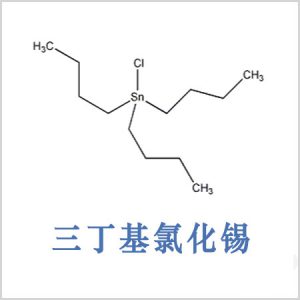Tri-n-butyltin chloride
Product name
Tributyltin chloride, Tributyltin chloride
English name: Tri-n-butyltin chloride
English alias: Chlorotributyltin; Tributyltinchloridecolorlessliq; Tri-n-butyltin choride; Tri-n-butylchlorotin; Trinbutyltinchloride; Chlorotri-n-butylstannane~Chlorotri-n-butyltin; TRIBUTYLTIN CHLORIDE; tributyl(chloro)stannane; tributylstannanylium chloride

Tri-n-butyltin chloride CAS 1461-22-9 Chlorotributyltin
Product description
Tributyltin chloride, a colorless liquid. Soluble in ethanol, heptane, benzene and toluene. Insoluble in ice water, hydrolyzed in hot water. Toxic, used as rodenticide, anti-rodent cable coating and synthetic intermediates.
| Tributyltin chloride | Tri-n-butyltin chloride | Tri-n-butyltin chloride | CAS 1461-22-9 | Chlorotributyltin |
CAS Number: 1461-22-9
EINECS number: 215-958-7
Molecular formula: C12H27ClSn
Molecular weight: 325.5058
Properties: colorless or light yellow liquid
Physical and chemical properties
Properties: colorless or light yellow oily liquid
Boiling point: 145-147℃, 171-173℃/25mmHG
Density: 1.118-1.202
Melting point: -9 ℃
Solubility: soluble in ethanol, heptane, benzene and toluene, insoluble in cold water, hydrolyzed in hot water
Toxicity: Toxic and corrosive
Refractive index n(20℃): 1.4900±0.0002
specific gravity d(20 ℃): 1.200±0.002
Fire point: ≥110 ℃
Specification: Content≥96.0%
Use
It has the functions of antiseptic, sterilization, and mildew prevention. Widely used in wood preservation, ship paint, etc. At the same time, it is widely used in the pharmaceutical industry as a pharmaceutical intermediate.
It can be used as a catalyst, the introduction of tributyltin groups in organic synthesis, and the synthesis of prostaglandins.
Packaging
200KG/bucket Storage: It is recommended to store in a dry and cool area with proper ventilation. After the original packaging, please fasten the packaging cover as soon as possible to prevent the product performance from being mixed with other substances such as waterproof grade. Store in a cool, dry place, keep the container tightly closed, and avoid contact with oxides. Do not inhale dust and avoid contact with skin and mucous membranes. Smoking, eating and drinking are prohibited in the workplace. After work, take a shower and change clothes. Store contaminated clothes separately and use them after washing. Maintain good hygiene habits.


